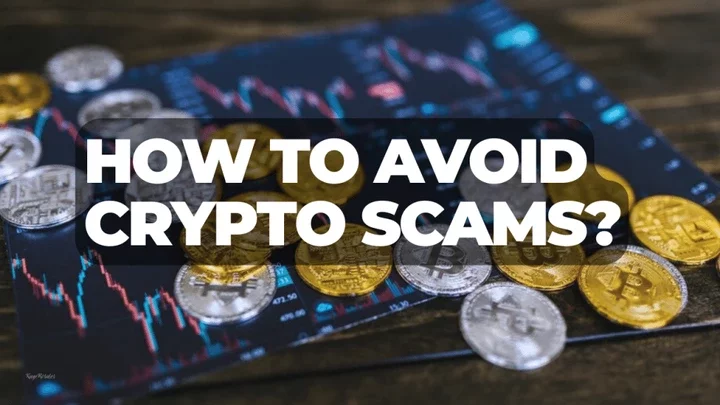How To Avoid Crypto Scams?

Key Takeaways
-
Educate yourself on common crypto scams to avoid falling victim. Don’t be fooled by promises.
-
Scammers are out there to steal your money. Don’t share your crypto passwords like you wouldn’t share your bank info.
-
Research before you invest. Read project documents and avoid anything unclear or suspicious.
-
Social media can be deceiving, be wary of investment promotions on social media. Scammers often use fake celebrity endorsements.
Cryptocurrency can be an exciting investment opportunity but beware of scams! Don’t share your crypto passwords just like you wouldn’t trust someone with your bank account information. Scammers use all sorts of tricks to confuse and steal your money, so educating yourself about common crypto scams is important.
Don’t be fooled by promises of quick and easy riches; if something seems too good to be true, it probably is. You can avoid these scams and keep your cryptocurrency safe by following these simple steps.
How To Avoid Crypto Scams
Cryptocurrencies can be both exciting and risky. While some people invest honestly, others try to steal your money. Here’s how to protect yourself from these scammers.
-
Protect Your Wallet: This digital wallet holds your crypto. Never share your private keys (like your crypto wallet password) with anyone. Consider using a seed phrase, a set of code words that acts like a master password to recover your wallet in emergencies.
-
Ignore Cold Calls: Be cautious if someone you don’t know contacts you about a crypto investment opportunity, mainly via phone calls (cold calls). Never reveal personal information or send money to strangers.
-
Too Good to Be True: High returns with little effort? That’s a classic red flag. If a company promises unrealistic returns on your crypto investment, it’s likely a scam. Crypto is inherently volatile, and guaranteed high returns are a dream.
-
Don’t Be Rushed: Legitimate investment opportunities allow enough time for research. Scammers often use time-pressure tactics like bonuses or discounts to confuse your judgment.
-
Avoid Social Media Hype: Be careful of crypto investment promotions on social media. Scammers may use celebrity images or endorsements (often fake) to make their schemes appear credible.
-
Read The White Paper: Before investing, research the company, project, or coin thoroughly. Look for a white paper, a document outlining the technology and purpose of the project. If details are sketchy or the project seems insignificant, avoid it.
Preventing Crypto Scams
Getting rid of crypto scams is difficult because scammers continuously develop their schemes. However, you can protect yourself and minimize their impact. Here’s a better approach:
-
Report to Crypto Exchanges: If you encounter a scam, report it to your cryptocurrency exchange. This helps them identify and block scammers, protecting other users. In some cases, if the scam happened within the platform, they might be able to help recover your funds.
-
Spread Awareness: Educate others about common crypto scams. Share your experience and schemes to help them avoid becoming victims.
-
Report to Authorities: Report the scam to relevant authorities, such as the US FTC (Federal Trade Commission). This helps track the scammers and bring them to justice.
Most Common Crypto Scam
-
Exit Scams: Imagine a developer creating a new crypto project, hyping it up for high returns, then running away with the cash before anyone can cash out. That’s an exit scam.
-
Pump and Dumps (ICO Scams): Tricky developers tempt investors with promising new coins with high returns. After the price jumps due to artificial hype (“pump”), they dump all their holdings, crashing the price and leaving investors holding worthless tokens.
-
Rug Pulls: This DeFi (decentralized finance) scam involves creating a new crypto project, attracting investors, and then disappearing (“pulling the rug”) before it’s even built. Investors are left with a worthless currency. Celebrity endorsements can also be part of the rug pull, with fake or misleading support claims from famous figures.
-
Phishing Scams: Phishing emails, texts, or social media messages might pose as job offers, requests for help, or “can’t-miss” investment opportunities. Scammers might request a direct crypto transfer and disappear or trick you into sharing your private keys so they can steal your funds.
Why Crypto Is Prone to Scams
Several factors make cryptocurrency a main target for scammers:
-
Decentralized: Unlike banks and traditional investments, crypto operates on a decentralized system (DeFi) with no central authority. This means there’s no regulator to stop suspicious transactions or stop things if goes wrong.
-
Irreversible Transactions: Blockchain technology makes transactions irreversible. Once you send your cryptocurrency, you cannot get it back, even if you’ve been scammed.
-
Pseudonymity: Crypto users interact with wallet addresses, not real names. These hidden identities make it difficult to track down scammers, especially those actively trying to hide their real information.
Final Thoughts
Cryptocurrency can be an exciting investment but has risks, including scams. Because crypto isn’t regulated, scammers can hide their identities and avoid being caught. The key to staying safe is education. The article emphasizes that anyone considering cryptocurrency investments should prioritize learning about common scams and taking a cautious approach. Don’t be swayed by promises of quick riches and always double-check the legitimacy of any project before investing.



